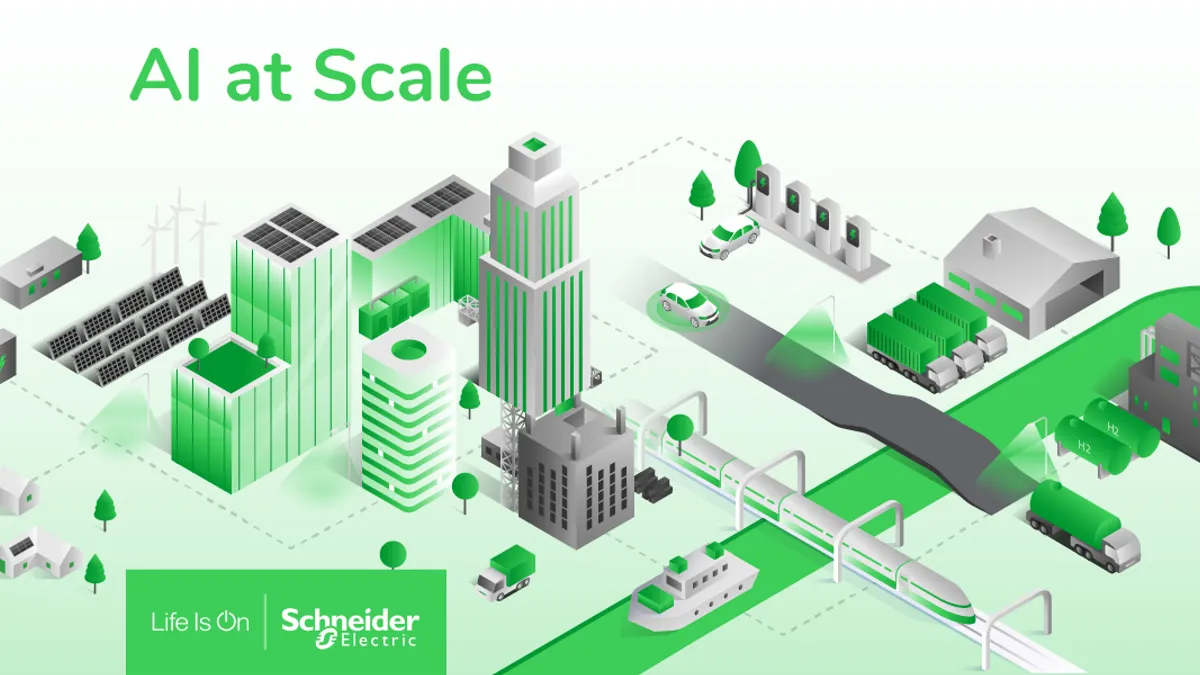Dive Brief:
- Schneider Electric is incorporating Microsoft Azure OpenAI into several products and services aimed at leveraging the capabilities of generative artificial intelligence to create text, code and other forms of content for customers and internal operations.
- By using generative AI, the company hopes to streamline time-consuming tasks, optimize resource allocation and boost the efficiency of operational processes, Schneider Electric said in a Nov. 13 press release.
- The company used a large language model to add a conversational AI tool to Resource Advisor, its energy and sustainability data hub. The Resource Advisor Copilot will aid facilities managers where swift aggregation of data on energy consumption and related resources is crucial, Sreedhar Sistu, vice president of AI at Schneider Electric, said in an interview.
Dive Insight:
With their potential to accelerate operational efficiency, cut costs and improve tenant satisfaction, generative AI tools can be useful for facilities managers, according to Rafi Dowla, co-founder and CEO of PremiseHQ, which automates data management for various facilities management functions across commercial and industrial properties.
Large language models are expected to spur improvements in efficiency, productivity and the overall performance of buildings, Sharad Rastogi, CEO of JLL Technologies’ work dynamics technology group, told Facilities Dive earlier this year upon the rollout of JLL GPT, a large language model aimed at providing commercial building operators more efficient access to building controls, leasing, utilization and portfolio optimization insights.
However, despite gaining some traction in facilities management, tools like ChatGPT, often encounter adoption barriers related to data security and privacy, Dowla said.
Schneider Electric’s Sistu echoed that sentiment. “The biggest concern with tools like ChatGPT is that it is public and it scrapes off the internet, and then whatever you feed into it also becomes public. So, there are risks associated with it, and concerns have been raised [about the lack of] security and privacy,” he said.

Resource Advisor Copilot aims to equip Resource Advisor customers with enhanced data analysis, visualization, decision support and performance optimization, strengthening their ability to process intricate industry knowledge, according to the company’s news release. Unlike traditional methods that involve searching for and synthesizing data, Resource Advisor Copilot lightens the workload for facilities managers and provides the “right context for information” in a more natural and streamlined way, Sistu said. A significant portion of this information exists in textual form that requires interpretation, understanding and processing, he noted.
Through its OpenAI integration, Schneider Electric is using two internal conversational AI assistants — Jo-Chat GPT, which provides a secure platform for Schneider employees, and Finance Advisor, which helps financial analysts locate precise information that can inform their decision-making in a consistent and timely manner. Sistu suggests that internal conversational assistants could be a template for professionals in facilities management and related functions who are looking to incorporate secure and private generative AI platforms within their teams.
The company is also exploring Github Copilot, a tool provided by Microsoft, for creating offers and conducting operations. “Internally, it allows us to be more efficient in writing code and developing applications,” Sistu explained. He anticipates that this type of emerging technology will be beneficial in developing specialized code for control systems in buildings. The intention is to leverage such technology for domain-specific language used in building control systems which may have “unique logic and syntax” not readily available in the public domain, he noted.














